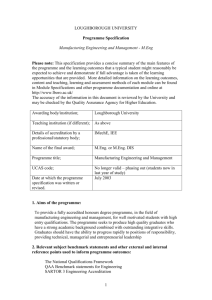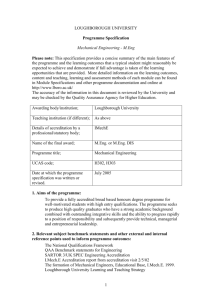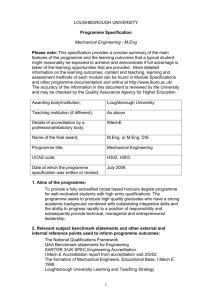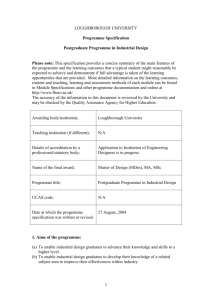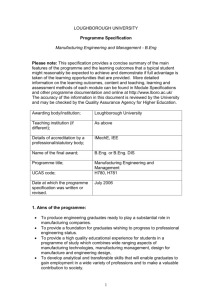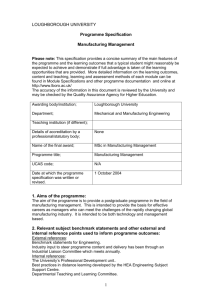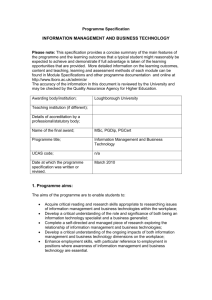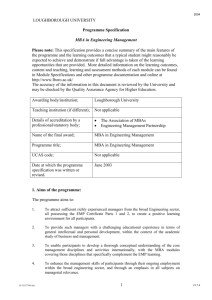BEng - Loughborough University
advertisement
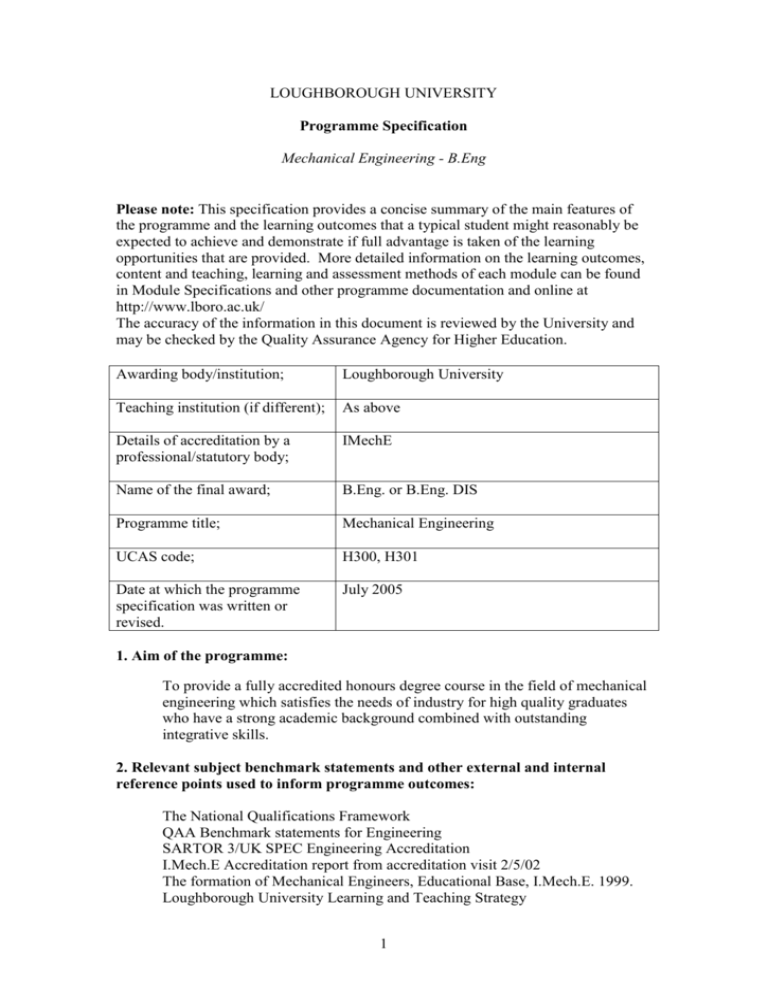
LOUGHBOROUGH UNIVERSITY Programme Specification Mechanical Engineering - B.Eng Please note: This specification provides a concise summary of the main features of the programme and the learning outcomes that a typical student might reasonably be expected to achieve and demonstrate if full advantage is taken of the learning opportunities that are provided. More detailed information on the learning outcomes, content and teaching, learning and assessment methods of each module can be found in Module Specifications and other programme documentation and online at http://www.lboro.ac.uk/ The accuracy of the information in this document is reviewed by the University and may be checked by the Quality Assurance Agency for Higher Education. Awarding body/institution; Loughborough University Teaching institution (if different); As above Details of accreditation by a professional/statutory body; IMechE Name of the final award; B.Eng. or B.Eng. DIS Programme title; Mechanical Engineering UCAS code; H300, H301 Date at which the programme specification was written or revised. July 2005 1. Aim of the programme: To provide a fully accredited honours degree course in the field of mechanical engineering which satisfies the needs of industry for high quality graduates who have a strong academic background combined with outstanding integrative skills. 2. Relevant subject benchmark statements and other external and internal reference points used to inform programme outcomes: The National Qualifications Framework QAA Benchmark statements for Engineering SARTOR 3/UK SPEC Engineering Accreditation I.Mech.E Accreditation report from accreditation visit 2/5/02 The formation of Mechanical Engineers, Educational Base, I.Mech.E. 1999. Loughborough University Learning and Teaching Strategy 1 3. Intended Learning Outcomes NB: Following periodic Programme Review in 2005, Intended Learning Outcomes will be reviewed in academic year 2005/06. On completion of the course, students should have acquired a broad base of engineering knowledge and experience. They should be self reliant and able to contribute well in team situations. They should have the ability to apply engineering principles effectively in a commercially aware industrial environment. More specifically: Knowledge and Understanding: On successful completion of this programme, graduates should be able to demonstrate knowledge and understanding of: relevant mathematical methods and the principles of engineering science as applied to mechanical engineering systems; a number of specialist engineering science disciplines the role of information technology in providing support for mechanical engineers engineering design principles and techniques. characteristics of engineering materials management and business practices appropriate to engineering industry. the professional and ethical responsibilities of engineers and engineering designers. Skills and other attributes: a. Subject-specific cognitive skills: On successful completion of this programme, students should be able to: interpret numerical data and apply mathematical methods to the analysis of engineering design problems use the principles of engineering science in developing solutions to practical mechanical engineering problems. analyse systems, processes and components. solve mechanical engineering problems. select and apply appropriate IT tools to a variety of engineering problems. create new engineering components and processes through the synthesis of ideas from a range of sources. b. Subject-specific practical skills: On successful completion of this programme, students should be able to: apply numerical modelling methods and/or appropriate computational techniques to engineering problems use appropriate computer software and laboratory equipment; research for information prepare engineering drawings computer graphics and technical reports and give technically competent oral presentations; demonstrate basic organisational and project management skills. 2 c. Key/transferable skills: On successful completion of this programme, students should be able to demonstrate a high level of numeracy; apply creative and structured approaches to problem solving; communicate effectively through written, graphical, interpersonal and presentation skills; design and implement basic computer based information systems; work independently; work in a team; organise and manage time and resources effectively; Teaching, learning and assessment strategies to enable the above outcomes to be achieved and demonstrated: Acquisition of the above knowledge and understanding is through a combination of lectures, tutorials, seminars, co-operative projects with industry, internal group and individual projects, practical laboratory work, industrial training (DIS students only) and coursework assignments. Assessment is through a combination of written examinations and assessed coursework. Coursework assessment varies from module to module and includes the evaluation of laboratory reports, technical reports, problem solving exercises, design portfolios, manufacture of prototypes, computer assisted assessment, oral presentations and viva-voce examinations. 4. Programme structures and requirements, levels, modules, credits and awards: The B.Eng programme in Mechanical Engineering is offered as a full-time programme three years or a sandwich programme of four years if taken with the optional year of industrial training in year 3 between parts B and C of the programme. The sandwich degree offers the additional award of Diploma of Industrial Studies (DIS). Students study modules with a combined weight of 120 credits in each part (academic year) of the programme and each part is taught in two 15-week semesters; weeks 13-15 being assessment weeks at the end of each semester. The programme structure is briefly described below and, in more detail in the Programme Regulations. Details of Module Specifications can be found at the following Web address:- http://cisinfo.lboro.ac.uk:8081/CI/WR0015.MAIN modules are listed under the department primarily responsible for them, e.g. module based in the School Module of Mechanical and Manufacturing Engineering are coded MM (previously MU = Manufacturing Engineering, MC = Mechanical Engineering). The credit weighting of each module is specified, 10 credits being approximately equivalent to 100 hours, on average, of student effort. 3 Part A Compulsory Subjects (120) Engineering Mathematics (20) Thermofluids (20) introducing. thermodynamics and fluid mechanics. Engineering Mechanics (20) introducing statics, dynamics and strength of materials. Materials Technology (10) Electronics and Electrical Technology (10) Design Communication and Manufacture (20) Introducing engineering drawing standards, CAD and a major design/make project. Engineering Insight (20) introducing study and communication skills, ICT systems, business management, manufacturing processes, mechanical and electrical measurement. Part B Compulsory Subjects (120) Engineering Mathematics (10) building on part A Thermofluids (20) extending Thermodynamics Heat Transfer and Fluid Flow Engineering Mechanics (20) extending Mechanics of Materials and Dynamics Control Engineering (10) Electrical Power and Machines (10) Application of Engineering Design (30) including an Industry Based project, an internal project on the design and analysis of machine elements and the further use of CAE Engineering Computation (10) Business Law, Finance and Quality (10) DIS or DINTS (optional) Our accredited industrial placement scheme leads to the additional award of Diploma of Industrial Studies. Alternatively, students may take an integrated year of study and training abroad in co-operation with a partner university, leading to the award of Diploma of International Studies. Part C Compulsory Modules (50) Individual Project (40) Computer Control and Instrumentation (10) Optional Modules (70) from the following Vibration Noise and Rotordynamics 1 (10) Computational Fluid Dynamics 1 (10) Design of Machinery 1: kinematics (10) Finite Element Analysis (10) Group Design Project (20) Engineering Design Management (10) New Product Development (10) Internal Combustion Engines (20) Laser and Optical Measurement (10) Materials Processing (10) Materials in Service (10) 4 Heat transfer (10) Welding and Joining Technology (10) Tribology (10) Laser Materials Processing (10) Robotics and Control (10) Metrology (10) Polymer Engineering (10) Computer Aided Engineering (10) Turbomachinery (10) Design for Assembly (10) Rapid Prototyping (10) Digital Image Processing (10) Study Abroad Within the Academic Year Students may make arrangements to study at an approved overseas institution for one semester in part C. 5. Criteria for admission to the programme: Candidates must be able to satisfy the general requirements of the University and of the School of Mechanical and Manufacturing Engineering; typically the requirements are: A Level Qualifications 260 points from: minimum grade C in Mathematics and Physics at A level plus a third A level or two AS levels. Vocational A level (VAL) 260 points from a minimum of 18 units or any combination of VAL units and AS or A level units. BTEC: Candidates Distinctions in mathematics and merits in all other subjects at level 3. Outstanding HND candidates may be eligible for second year entry. Advanced highers: BCC from mathematics, physics and a third advanced higher (or two highers) International Baccalaureate: Total score of 30 points with a minimum 6 in higher level mathematics and physics. Selection procedures Applicants are not formally interviewed. When we make an offer of a place we encourage candidates to visit the university to meet staff and current students and to tour the facilities. These can be one or two day's duration. Our special overnight visits which incorporate an informal interview have proved to be the best way to find out what living and studying in Loughborough is really like. 5 6. Information about assessment regulations: The method of assessment for each module is described within the relevant module specification (see section 4 above). Examinations are held in each subject for which an examination is required in the assessment period at the end of the semester in which it is taught. At the end of each year the results from examinations and coursework assessment will be combined, as detailed in each module specification. Percentage scores are calculated to one decimal place and then rounded to the nearest integer. The results for each module are compiled and considered by an examination board, which awards credit for each satisfactorily completed module ( 40%). Students who achieve sufficient credit to meet the assessment requirements of their programme regulations will be allowed to proceed to the next year of their course. Briefly, 100 credits are needed for progression in each year of a B.Eng degree however, in addition, this programme demands that students achieve a minimum standard of 30% in failed modules. This rule is applied to ensure that students are not permitted to skip modules on which later material may be based. Readers are directed to the programme regulations (attached) for full details of this and the criteria for the award of a degree. Candidates not meeting the criteria for progression will have the right to be re-assessed on one further occasion and, for Parts A and B of the course, this re-assessment may take place in the University’s Special Assessment Period in early September or in the next academic year. Re-assessment in the Special Assessment Period is not permitted for final year candidates or if less than 60 credits has been achieved. Any candidate who, at the end of part A, achieves 120 credits with a calculated minimum overall year average of 55% will be eligible for transfer to the M.Eng programme in Mechanical Engineering. Upward transfer after Part A will only be allowed in the case of exceptional performance. 7. Indicators of quality: The course is fully accredited by the Institution of Mechanical Engineers. In Teaching Quality Assessment, the School was awarded 23 points out of a maximum of 24, confirming it as a leader in quality of teaching. In the last Research Assessment Exercise (RAE) we achieved a grade 5; the School is continually building on this achievement and is confident of improving its rating in the future. 6 8. Particular support for learning: Careers: The Wolfson School employs a full time officer to offer advice regarding careers and industrial placements. Also the University’s Careers Office run timetabled tutorial sessions within the programme’s curriculum. http://www.lboro.ac.uk/service/careers/section/careers_service/welcome.html The Careers Service provides support and advice for students seeking careers guidance and help with job-searching techniques, together with a library of careers resources, careers fairs, employer presentations, management and skills courses and a comprehensive website containing vacancies and information. In the UK Graduate Careers survey, sponsored by the Times Newspaper, Loughborough University Careers Service was rated as one of the most impressive with over 80% of students rating it as good or excellent. The service has also been identified by employers as the amongst the top ten Higher Education careers services in the 2003 Association of graduate Recruiters/Barkers survey. Library: http://www.lboro.ac.uk/library/ The University Library provides advanced support for student learning in a purpose-built building and electronically via the web. It is open for upwards of 80 hours per week during semester and holds a stock of more than half a million volumes and an extensive serials collection. Numerous PC workstations (100+), networked printing facilities and self-service photocopiers are also available. The Library is designated EDC (European Documentation Centre). The Library catalogue is available on-line, as are electronic versions of reading lists. Over 180 subject-specific electronic databases can be accessed by users both on campus and elsewhere. The Library organises induction sessions for first year students and librarians can provide flexible training for students and researchers throughout their time at Loughborough. User support is also available from the Library information desks, via printed and online guides and through a series of ‘Lunchtime in the Library’ and other training sessions. There are a variety of study environments in the Library, including individual and group study desks, private carrels and group study rooms. . Computing Facilities: The School has installed many computers to enhance the extensive central facilities provided by the Computing Services (see below). The additional facilities provided by the School fall into two general categories:Group 1 – Computing services primarily intended to support teaching activities. Access to these machines is limited only by timetabled teaching/tutorial requirements. 7 Group 2 – Computers intended to support research in the School, but to which students have access whilst undertaking certain electives and/or by prior arrangement with their project supervisor. Group 1 The School has many PCs that are used to support its teaching activities by exposing students to relevant applications software. The largest concentration of these is in the PC Rooms TW/1/15 and T/2/10. All of these computers use Microsoft Windows NT. The two CAE Rooms (TW/1/14 and T2.09) house Engineering Workstations that are used extensively to support CAD and CAE teaching. These workstations use the UNIX operating system with the Common Desktop Environment as windowing systems. A further substantial group of workstations and PCs have been installed in the Design Projects area as part of an Engineering Faculty initiative. Group 2 The majority of the computer based research in the School is done on similar Sun Microsystems and Windows NT workstations. Those students opting for projects closely allied to these research projects in their final year should therefore already be familiar with this type of facility. http://www.lboro.ac.uk/computing/index.html Computing Services provides the University IT facilities and infrastructure. General purpose computer resources across campus are open 24 hours and more specialist computer laboratories are provided I partnership with departments. Students in halls of residence are supported in connecting their computers to the high speed network. The University’s virtual learning environment “LEARN” provides on and off campus access to web-based teaching materials provided by lecturing staff. Professional Development http://www.lboro.ac.uk/service/pd Professional Development (PD) provides continuing professional development and support in teaching and a wide range of other areas. New lecturers attend a personalised programme of PD courses and, in the final year of probation, PD assesses their teaching through direct observation and a portfolio. Accreditation for this process has been awarded by the Higher Education Academy (HEA). PD works directly with staff who wish to develop more effective teaching and learning methods – including the area of learning technologies – and provides resources to support the learning skills development of students. Other development opportunities are provided in institutional strategic priority areas and in response to discussions with departments in the context of their needs. Counselling Service and English Language Study Unit: The Counselling Service and English Language Study Unit are able to support individual students in resolving problems and in improving communication skills for international students. 8 Engineering Education Centre: The Engineering Education Centre supports the implementation of innovative Teaching and Learning Methods into the curriculum, within the Faculty of Engineering, via the use of appropriate technologies. The Centre provides a focus for computer based learning and teaching activities in the Engineering Faculty, unlimited advice on Computer aided learning/assessment and distance learning materials, a limited amount of free software development time, and help to secure funding and manage projects relevant to learning and teaching. The Mathematics Learning Support Centre: http://learn.lboro.ac.uk/sci/ma/mlsc/ The Centre, which is based in the Department of Mathematical Sciences, provides a range of services designed to support any undergraduate student in the University in their learning of mathematics. In particular it aims to help students in the earlier stages of their studies who might benefit from resources and tuition over and above that normally provided as part of their course. The Virtual Engineering mathematics Learning Support Centre provides online help for Engineering students in mathematics. This site is an additional resource provided by the mathematics Learning Support Centre in conjunction with the HEA Engineering Subject Support Centre, providing students with an additional way of accessing some of the resources held within the centre – 24 hours a day. Disabilities & Additional Needs Service: http://www.lboro.ac.uk/disabilities/ The Disabilities and Additional Needs Service (DANS) offers support for students and staff including: advice both on matters relating to the Special Educational Needs and Disabilities Act (SENDA); adaptation of course materials into Braille/large print/tape/disk/other formats; organising mobility training; BSL interpretation; provision of communication support workers; note takers in lectures/tutorials; assessment of specific support, equipment and software needs; individual/small group tuition for students who have dyslexia; representing students’ needs to academic and other University departments; organising adapted accommodation to meet individual needs; helping to organise carers to meet any personal care needs; organising appropriate support for students who have a mental health problem. DANS has links with the RNIB Vocational College, Derby College for Deaf People and the National Autism Society to offer effective support to students at the University. It regularly takes advice from other national and local organisations of and for disabled people. Where a student has complex support or accommodation needs, contact with DANS is strongly advised prior to application. 9 9. Methods for evaluating and improving the quality and standards of learning: http://www.lboro.ac.uk/admin/ar/policy/aqp/index.htm The University has a formal quality procedure and reporting structure laid out in its Academic Quality Procedures handbook, available online at: http://www.lboro.ac.uk/admin/ar/policy/aqp/index.htm and directed by the Pro-Vice-Chancellor (Teaching). Each Faculty has an Associate Dean for Teaching responsible for all learning and teaching matters. For each Faculty there is a Directorate (responsible for the allocation of resources) and a Board (responsible for monitoring quality issues within each department). Support is provided by Professional Development. Student feedback on modules and programmes is sought at regular intervals, individual programmes are reviewed annually, and Departments review their full portfolio of programmes as part of a Periodic Programme Review (every five years). Minor changes to module specifications are approved by the Associate Dean (Teaching) on behalf of the Faculty Board, and ratified by the University Curriculum Sub-Committee in accordance with the University's quality procedures. Major changes are formally considered by the University Curriculum Sub-Committee. All staff participate in the University's staff appraisal scheme, which helps to identify any needs for staff skills development. Both probationary staff and those seeking promotion to Senior Lecturer are subject to a formal teaching evaluation scheme, administered by Professional Development and accredited by the Higher Education Academy. 10
